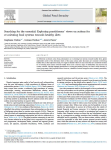Kelemen E., Megyesi B., Matzdorf B., Andersen E., van Bussel L.G.J., Dumortier M., Dutilly C., García-Llorente M., Hamon C., LePage A., Moruzzo R., Prager K., Riccioli F., Yacaman Ochoa C. (2023). The prospects of innovative agri-environmental contracts in the European policy context: Results from a Delphi study. Land Use Policy, 01/08/2023, vol. 131, p. 1-10.
https://doi.org/10.1016/j.landusepol.2023.106706
https://doi.org/10.1016/j.landusepol.2023.106706
| Titre : | The prospects of innovative agri-environmental contracts in the European policy context: Results from a Delphi study (2023) |
| Auteurs : | E. Kelemen ; B. Megyesi ; B. Matzdorf ; E. Andersen ; L.G.J. van Bussel ; M. Dumortier ; C. Dutilly ; M. García-Llorente ; C. Hamon ; A. LePage ; R. Moruzzo ; K. Prager ; F. Riccioli ; C. Yacaman Ochoa |
| Type de document : | Article |
| Dans : | Land Use Policy (vol. 131, August 2023) |
| Article en page(s) : | p. 1-10 |
| Langues : | Anglais |
| Langues du résumé : | Anglais |
| Catégories : |
Catégories principales 06 - AGRICULTURE. FORÊTS. PÊCHES ; 6.3 - PACThésaurus IAMM POLITIQUE AGRICOLE ; PAC ; POLITIQUE AGRIENVIRONNEMENTALE ; AIDE AGRIENVIRONNEMENTALE ; CONTRAT ; EUROPE |
| Résumé : | Innovative agri-environmental contracts are increasingly studied in the literature, but their adoption has been relatively slow and geographically scattered. Action-based agri-environmental measures remain the predominant policy mechanism across Europe. A three-round Policy Delphi study was conducted with policy makers, scientific experts, farmers? representatives, and NGOs from across 15 different European countries, to investigate how and under which circumstances novel contractual solutions could be implemented more widely. The expert panel perceived result-based and collective contractual elements as the most promising. Although considered beneficial from several aspects, value chain contracts were perceived less relevant to the policy environment. The Common Agricultural Policy (CAP) Pillar 2 measures were highlighted by the experts as the key policy area to implement novel contracts by national or regional authorities, but Pillar 1 eco-schemes, being launched in the CAP 2023?2027, were also considered as a potentially suitable framework for testing and implementation. The Delphi panel envisaged innovative contracts should be adopted by governments in iterative steps and not as a complete substitute for current payment schemes, but rather as an additional incentive to them. Such an incremental approach allows contractual innovations to capitalise on existing best practices. But it also implies the risk that innovative contracts could remain marginal and fail to substantially change farmers? behaviour, resulting in a failure to improve environmental conditions. |
| Cote : | En ligne |
| URL / DOI : | https://doi.org/10.1016/j.landusepol.2023.106706 |







